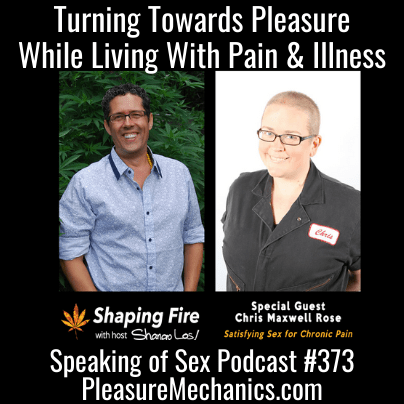Podcast: Play in new window | Download

Illness, injury, accidents and other sudden health changes disrupt our lives on all levels – including our sexuality, relationships and even our sense of identity. When our bodies experience massive changes, or are facing chronic pain or terminal illness, how do we begin to find a new normal in our sex lives? How can we turn towards pleasure again in the face of massive and ongoing changes?
This episode is an intimate interview between Pleasure Mechanic’s own Chris Maxwell Rose and Shango Los of the Shaping Fire podcast. Big love to Shango for hosting this beautiful conversation and for allowing us to share the full episode here. Shaping Fire is a leading cannabis podcast, covering medical cannabis, cannabis cultivation and more.
Podcast Episodes Mentioned:
- Spontaneous Vs. Responsive Desire
- Dual Model Control Of Arousal : Learn about the “gas and brakes” model of arousal
- Your Body Is Good Enough
- What Do You Want?
Other Resources Mentioned:
- Elle Chase’s book on positions for curvy bodies, useful for anyone looking for support around positions and modifications
- Disability Justice Resources
- 10 Principles of Disability Justice
Love the podcast? Ready for more?
Join The Pleasure Pod & Get The Interactive Worksheet & More of the Best of Pleasure Mechanics!